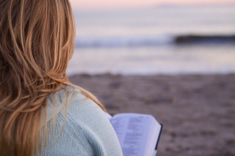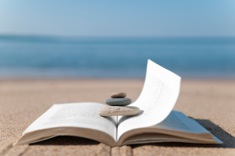The first few days of my very first summer vacation had progressed fairly uneventfully, when I found myself having a minor panic attack while gripping a vacuum cleaner. The spark of this had been a quick glance at the clock — it was 10:30! I had been up for over three hours and all I had done was read part of a magazine, write a few emails, and vacuum. At this rate, the summer was going to be over before I knew it, with no major growth in myself (and really, when I looked around, the apartment wasn't looking that much better either).
As I sat down on the couch, the same unrelenting planning that I do during the school year — which I like to call preparedness and others might call perfectionism — started running through my head. Alright, first things first. I needed to decide on my exact goals for the summer. Second, I needed to write out a list of things I would do to get there. Third, I'd schedule my time. Perfect! At the end of August, I would go back to school refreshed, and therefore a better teacher, with the knowledge that I had accomplished everything I set out to do.
I reached for my notebook, and gleefully took off the pen cap. I couldn't wait to begin. Then, as I flipped to the next blank page, I saw my cat sitting on the arm of the couch, staring at me as if I were crazy.
I stopped for a minute and stared (metaphorically, anyway) at myself. I am crazy, I thought. I spend the school year with days divided by bells and schedule meetings, and now I am going to willingly do this during the summer as well? And so, instead of making a list or schedule, I began a journal entry. In the writing, I thought about what I really want to do with my summer, and why I might prevent myself from relaxing enough to do it. When I had finished, I did actually have some goals in my mind. But they were much more general than I had previously thought they would be. This summer, I was going to:
1. Read
2. Write
3. Walk
Of course, I didn't change my entire personality in that one moment. I still do have some specific goals imbedded in these — for instance, I have some educational books and young adult novels I bought during the school year that I haven't got a chance to read yet, and I have some pieces I started during writing workshops at graduate school that I'd like to finish. However, by keeping my goals general, I've left room for the new summer opportunities that presented themselves — I became taken with picking berries and learned how to make jam; I've become much more dependable when throwing a Frisbee.
As the days of summer pass (and they still seem like they're racing!), I see more clearly how the lessons I'm learning at home are the same lessons I need to learn in the classroom:
1. Start with the general, over-arching goals (and don't forget these!)
2. Keep in mind that the focus should be reading and writing
3. Schedule, but know it will change as new opportunities arise
4. Go a little easier on myself
Luckily, I have much longer than a summer to keep working on these lessons.






